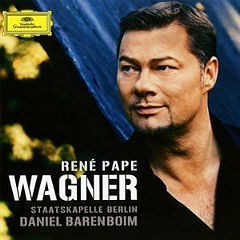In the liner notes to his new Wagner CD
, Rene Pape opines that performing the master’s work isn’t terribly different than performing Mozart. Both composers require singers to sustain a melodic line, manipulate vowels at the right moments and deploy dynamic gradations for dramatic effect. Call it German bel canto or natural speech, just don’t expect an overdramatized wall of sound and declamation.
The release on Deutsche Grammophon shines a light on this approach through a unusual mix of excerpts with Daniel Barenboim and the Berlin Staatskapelle and a bonus appearance by Placido Domingo in selections of Act 3 from Parsifal. While Pape’s rich tones and gorgeously spun lines may be reason enough for many to click “buy,” some of the interpretations come off as underpowered and a little vanilla, leaving it unclear whether he’s yet put a distinct stamp on some of the composer’s touchstone roles.
In the theater, Pape’s recent portrayals of Boris Godunov or King Marke in Tristan und Isolde conveyed a gripping contrast of vulnerability and might, supported by his voice’s remarkable flexibility. Maybe some subtle phrasing is lost in the digital transfer, but Wotan’s farewell to Brunnhilde from Die Walküre falls short on the CD, neither coming off as a tragic soliloquy or expressing the kind of despair we’ve heard from the likes of a Bryn Terfel, Pape’s most worthy current rival in this role. Pape’s fabulous diction makes up for some of his apparent reserve, but the care and control in his approach seem to sap the scene of some of its necessary anguish.
Wolfram’s “O du mein holder Abendstern” from Tannhäuser has some of the same issues. Pape delivers a noble and lyric account but, at least to these ears, doesn’t capture enough of the stoic suffering this upstanding character endures when he grasps he’ll never realize his love for Elizabeth. We’re not asking for Italianate sobs here, maybe just a bit more feeling.
The Die Meistersinger excerpts are more spot on, though one wonders why the showpiece Act 3 monologue “Wahn, Wahn, uberall Wahn’’ is omitted for Hans Sachs’ less interpretively interesting paean to German art at the opera’s conclusion. In the Act 2 Fliedermonolog, Pape dreamily reflects on the midsummer scent of the elder blossoms and the strange song of Walther’s that set quarters of Nuremberg on edge by breaking all of the mastersinger’s rules. It’s a vivid and polished performance. Pape also essays the brief walk-on as the opera’s Night Watchman and King Henry’s Act 1 monologue from Lohengrin — enjoyable if brief selections that one doesn’t usually find on an excerpts CD.
The four bits of Parsifal are keenly sensitive to the work’s harmonic shifts and long musical lines. The slightly fussy take may be magnified by Barenboim, whose expansive Wagner interpretations aren’t to everyone’s liking but who has the Staatskapelle firmly dialed in and provides some beautiful orchestral sound. Domingo at 70 again proves to his detractors that he has more goods than many tenors in their prime, though his presence gives you the feeling this part of the set is less about Pape and Wagner than about promoting DG’s biggest stars.
True to his word, Pape offers a convincing argument that a frenetic, text-centric style of delivery doesn’t best serve Wagner’s intentions. Finding fault with such a sincere and talented artist might also come across as mere quibbling. But in places, this CD unexpectedly reminds us how much we need gripping emotional commitment and even some tasteful idiosyncrasies to make this complex music really soar.



